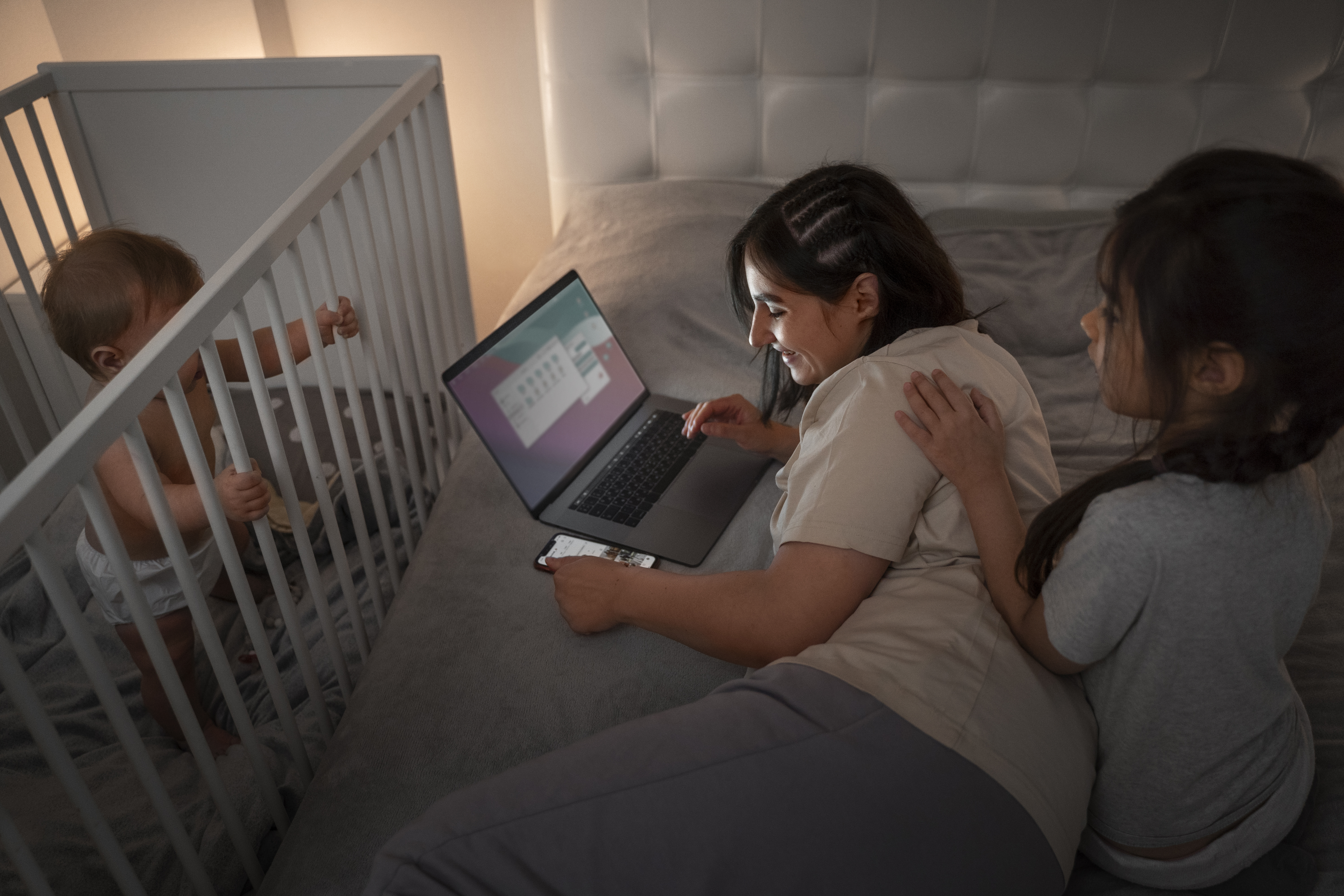From Sleep and Wellness Clinic – Your sleep therapist



"Just feed, cuddle, and put the baby down. How hard can it be?"
Those were my confident words before becoming a mom. If someone had told me I'd eventually become a certified baby sleep consultant in Chennai after struggling through countless sleepless nights with my own child, I would have been shocked. But sometimes our biggest challenges teach us the most valuable lessons.
As someone who now provides sleep advice for parents professionally, I believe in sharing the honest truth about my own experience. Because here's the reality – we all stumble as new parents, especially when it comes to sleep. The difference lies in learning from these experiences and using them to help others avoid the same pitfalls.
Before my baby arrived, I felt prepared. I'd read countless books, attended classes, and felt confident about how to get baby to sleep. My plan was straightforward: establish routines early, follow expert advice, and everything would work smoothly.
Life had different ideas.
Like most new parents, I quickly discovered that real babies don't follow textbook guidelines. They don't stick to neat schedules or respond predictably to standard solutions. Despite my best intentions, I found myself making sleep training mistakes that seemed obvious later but felt completely logical when running on minimal sleep.
What Happened: I allowed my baby to sleep in our bright, noisy living room during the day, believing they needed to adjust to household sounds. I thought babies should fit into our existing routines.
The Wake-Up Call: I discovered that darkness and quiet environments aren't optional luxuries – they're essential for healthy sleep. Darkness naturally triggers melatonin production, the hormone that helps regulate sleep cycles. Even tiny babies respond better when given proper sleep conditions.
My Current Approach: I now emphasize creating suitable sleep environments from the beginning. This includes blackout curtains, white noise to buffer household sounds, and treating daytime naps as seriously as nighttime sleep.
What Happened: I avoided structured routines, thinking they were too restrictive for newborns. I believed "following the flow" was more natural and approached each sleep period without any consistent plan.
The Learning: Babies actually thrive on predictability. Without regular cues, they can't anticipate sleep times, making the process more difficult for everyone. Consistent patterns provide security and help develop their internal rhythms.
What Works Better: Even simple, adaptable routines make a significant difference. A regular sequence of calming activities helps babies understand that sleep time is approaching, creating smoother transitions.
What Happened: I let my baby sleep whenever and for however long, thinking more sleep was always beneficial. I didn't understand age-appropriate wake periods or how daytime sleep affects nighttime rest.
The Result: Random nap schedules created difficult evenings. An exhausted baby who'd slept excessively during the day became nearly impossible to settle at night.
The Insight: Learning about age-appropriate wake windows was a game-changer. Babies have natural biological rhythms, and working with these patterns rather than against them makes sleep easier for the whole family.
What Happened: I attempted to follow every piece of well-meaning advice I received, from family traditions to friends' latest discoveries. Each week brought a new approach based on someone else's success story.
Why This Failed: Constantly switching methods confused both my baby and me. What succeeds for one family may not work for another, and changing strategies too frequently prevents you from seeing if an approach might actually be effective.
My Current Philosophy: I now help parents evaluate advice based on their own family's specific needs and circumstances. While there's no universal "perfect" method, there are research-backed principles that can be adapted to each family's unique situation.
What Happened: I worried constantly about establishing "problematic patterns" by holding my baby for naps or using motion to help them sleep. I thought every comfort I provided would somehow prevent independent sleep later.
The Reality: When it comes to meeting your baby's needs, there aren't inherently "wrong" choices – only decisions that may or may not work sustainably for your family. Some babies require more initial support, and that's completely normal.
My Approach Now: I focus on building connection and meeting babies at their current developmental stage, while gradually developing skills over time. It's about finding balance rather than following rigid rules.
What Happened: I believed I needed to figure everything out independently. Asking for support felt like admitting inadequacy, so I struggled through difficult nights and exhausting days without help.
The Price: This isolation led to burnout, worry, and feeling like I was failing as a mother. I missed opportunities for rest and support that could have made the entire experience more positive.
What I Share Now: Accepting help isn't weakness – it's smart parenting. Whether it's your partner handling night duties, family assisting with daily tasks, or professional guidance for sleep challenges, support makes everything more manageable.
What Happened: I focused so completely on my baby's needs that I neglected my own physical and mental health. I thought being a "good mom" meant sacrificing everything for my child.
The Truth: Exhausted, overwhelmed parents struggle to provide optimal care for their children. My own fatigue affected my patience, decision-making ability, and capacity to enjoy early parenthood.
The Lesson: Taking care of yourself isn't selfish – it's necessary. Parents need rest, support, and sometimes professional guidance to navigate this challenging period successfully.
I've learned to watch for my baby's natural signals while providing consistent, calming routines that support their development. This means being attentive without being reactive to every small sound or movement.
Instead of focusing on rigid timelines or comparing my baby to others, I emphasize building secure attachment and trust. This foundation makes everything else fall into place more naturally.
Even as a professional sleep consultant, I continue learning. Every baby is different, research evolves constantly, and staying curious rather than dogmatic serves families better.
I've surrounded myself with other parents, professionals, and resources. This community provides both practical assistance and emotional support during challenging phases.
Based on my personal experience and professional training, here are principles that consistently work:
Sometimes, despite our best efforts, sleep challenges continue. Consider consulting a certified baby sleep consultant in Chennai if:
Early morning wake-ups deserve special mention because they're one of the most frustrating sleep challenges parents face, often requiring specific strategies to resolve effectively.
My journey from making numerous sleep mistakes to becoming a sleep consultant wasn't just about learning techniques – it was about understanding that parenting is an ongoing learning process, not a test to pass perfectly.
To every parent reading this while trying to settle a fussy baby at 3 AM, wondering if you're making all the wrong choices – you're not alone. We've all been there, making decisions based on exhaustion and overwhelming advice.
Important Reminders:
Now that I help other families navigate sleep challenges professionally, I notice common patterns in the mistakes we all make. Most stem from:
Too Much Information: Conflicting advice can be overwhelming. Focus on evidence-based approaches that align with your family's values and circumstances.
Comparison Issues: Every baby develops at their own pace. Your neighbor's baby sleeping through the night at 10 weeks doesn't mean you're doing anything wrong if yours isn't.
Black-and-White Thinking: Sleep improvement isn't all-or-nothing – gentle, gradual approaches often work better than dramatic changes.
Ignoring Individual Differences: What your baby needs might differ from what worked for others, and that's perfectly valid.
Even now, as a sleep consultant, I continue learning and growing. Each family I work with teaches me something new about the incredible variety of children's sleep needs and family situations.
If you're currently facing sleep challenges, know that positive change is possible. My experience going from making every sleep mistake possible to helping other families find rest shows that our biggest struggles often become our greatest sources of strength.
Remember: you don't need to solve everything alone, you don't need to be perfect, and you don't need to sacrifice your own wellbeing in the process.
Whether you're just beginning your parenting journey or
feel stuck with ongoing sleep difficulties, personalized
guidance can make a significant difference. As someone who's
experienced these challenges firsthand and found solutions, I'm here
to help your family achieve the rest you deserve.
and let's work together to create a sleep plan that fits your unique family.

Good Sleep Changes Everything: Expert Gentle Sleep Training That Actually Works
Most of us know what it feels like to lie awake at 2 AM, staring at the ceiling. Or to drag ourselves out of bed after ...
Read More
Teething and Sleep: What’s Really Keeping Your Baby Up at Night?
You’re up at 2 AM again, pacing the hallway with a baby who seems wide awake and entirely uninterested in going back ...
Read More